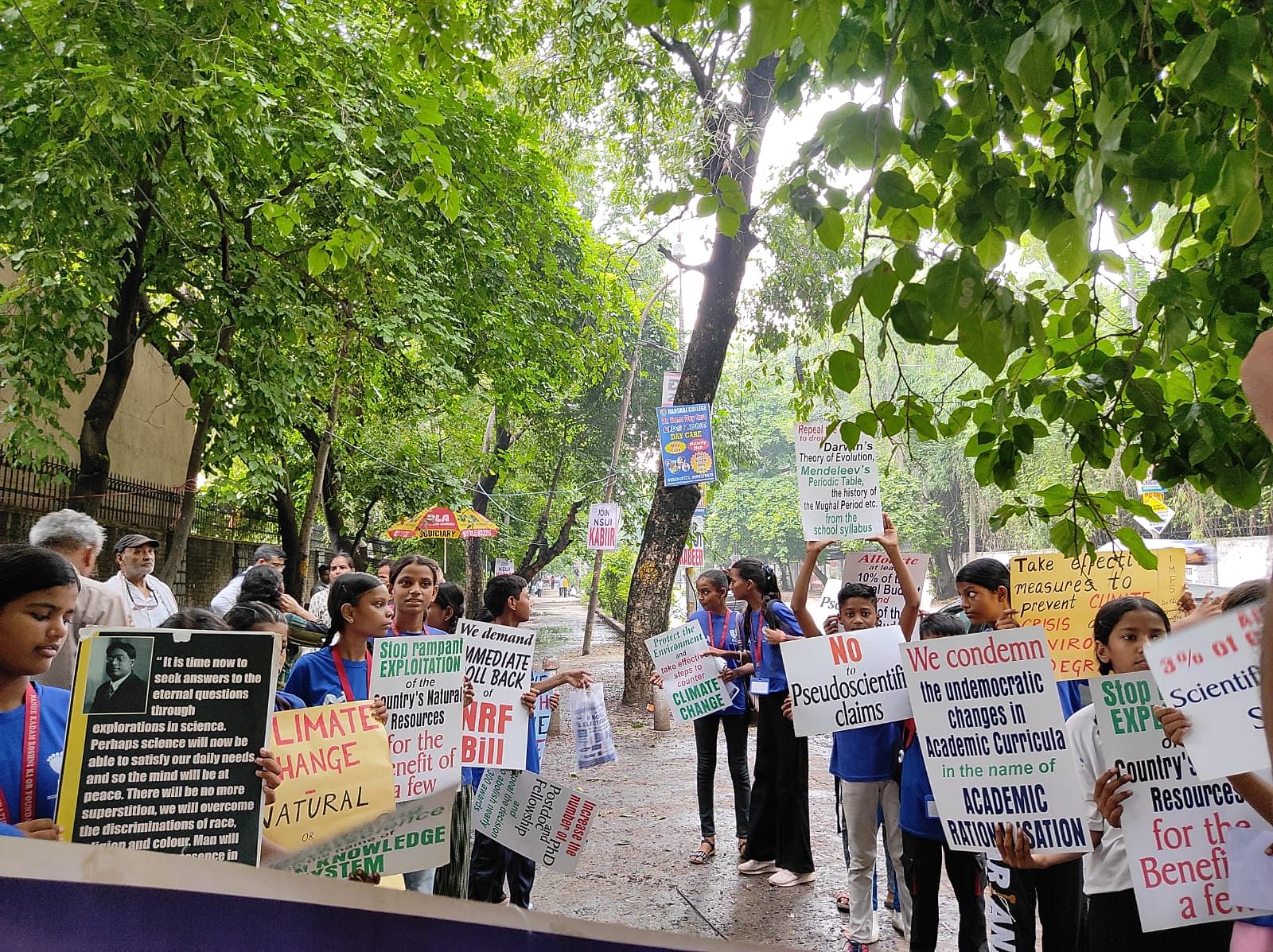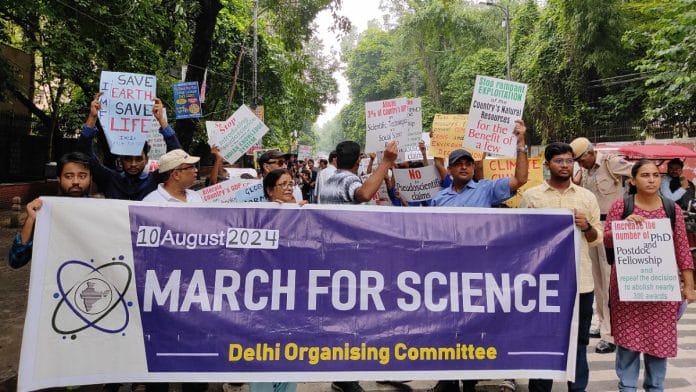New Delhi: The Delhi chapter of the India March for Science (IMFS) held Saturday at the Faculty of Arts, North Campus, Delhi University, saw professors, teachers, activists, and school and college students voicing their concerns about climate change, environmental degradation, and the dangers of pseudoscience. Undeterred by a heavy downpour, the participants went ahead with the march, aimed at promoting a scientific temper and squashing dubious claims.
March for Science, a global event, was held for the first time on 22 April 2017, on the occasion of Earth Day. The event was started as a protest against unscientific claims by the administration of the then US President Donald Trump and his denial of climate change.
The India March for Science is held in several cities, including Bengaluru, Kolkata, Chennai and Ahmedabad.
The focus of this year’s march was on promoting scientific temper among ordinary people, especially young people; advocating the importance of scientific research; preventing the propagation of pseudoscientific information; and spreading awareness about climate change.
“The propagation of unscientific beliefs and degradation of the environment are issues the scientific community is concerned about, and the march is raising these issues, and demanding that the government address this. The response of participants has been great,” Dr Soumitro Banerjee, a professor at the Indian Institute of Scientific Education and Research (IISER), Kolkata, and the general secretary of Breakthrough Science Society, told ThePrint. He is the principal coordinator of the India March for Science.
“Pseudoscience is detrimental and dangerous to society. One has to believe in evidence-based science. Scientific evidence shows that there is climate change. We are approaching the ‘tipping point’, which refers to the point of no return. Extreme weather conditions such as heatwaves, untimely rain and flash floods are signs that we are approaching tipping points. If you reach the ‘tipping point,’ you cannot go back,” he added.
The organisers of the march alleged that the government is not doing enough to combat climate change.
“The India March for Science is a weeklong event. Extreme heat in summers and severe air pollution in winters in Delhi-NCR are attributable to climate change. The central and state governments are not taking any significant steps to prevent this. The march is important because the scientific community makes policymakers aware of several important scientific issues,” Dr Vinay Kumar, associate professor, Zakir Husain Delhi College, Delhi University, and coordinator, India March for Science (Delhi), told ThePrint.
He added that the government closing down Vigyan Prasar, an autonomous body that promoted scientific thinking and served as a nodal agency for science communications, was “saddening”.

‘Millions dying due to climate change’
India spends less than 0.8 percent of its Gross Domestic Product (GDP) on science and technology, unlike most developed and developing countries, which spend about 2.8 to 3.5 percent of their GDP. The volunteers at the march emphasised the importance of increasing expenditure on science and technology activities.
Experts gathered at the march said the fact that only 2.59 percent of the Union Budget 2024-25 has been allocated to education was a “grave situation”.
Asked about his opinion on people who deny climate change, Kumar said, “I would ask them to stop living in centralised air-conditioned homes and to not travel in luxury cars. That is when they will realise what the situation of the environment is. Millions of people around the world are dying due to climate change.”
He cited the examples of Ladakh, Kedarnath and Wayanad, where the effects of anthropogenic activity-induced climate change are visible.
“I have been living in Delhi University’s North Campus for 20 years, since my master’s. Earlier, several migratory birds used to come. Now, not a single bird can be seen. Due to climate change, they have stopped migrating,” Kumar said.
Removal of periodic table, evolution theory from syllabus ‘worrying’
As part of the National Education Policy 2020, the periodic table and Darwin’s Theory of Evolution have been removed from NCERT science textbooks before Class 11, introducing these topics only to students in classes 11 and 12 who opt for science. This was one of the issues raised by professors and activists at the Delhi chapter of India March for Science.
Dinesh Mohanta, a science activist and one of the organisers of the India March for Science (Delhi), told ThePrint that nothing is as “dangerous” as the propagation of unscientific things. He also said that the removal of integral science topics from schoolbooks is “worrying”, and will have dire consequences in the long term.
Citing the example of how Newtonian mechanics in physics evolved into quantum mechanics, Mohanta said that scientific discoveries and theories postulated by researchers of a particular generation become inadequate a few generations later because of new findings. Therefore, it is important to keep an open mind and be ready to accept newer scientific facts, he said.
Adrika, a march coordinator, told ThePrint that the response to the event was “overwhelming”. She said that rain had not been anticipated, but the fact that it did not deter young students from participating in the march was “deeply inspiring”.
“Science is not just a tool to earn money. Science is ‘truth’. People have been martyred for spreading their scientific knowledge. If we spread science as a temperament and make it fun, people will never forget it,” she said.
(Edited by Sanya Mathur)
Also read: SC judges agree climate change is a threat. That’s where consensus ended at a book launch.






